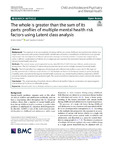The whole is greater than the sum of its parts: profles of multiple mental health risk factors using Latent class analysis
Göbel, Kristin
Cohrdes, Caroline
Background: The exposure to an accumulation of various risk factors during childhood and adolescence relative to a
single risk is associated with poorer mental health. Identifcation of distinct constellations of risk factors is an essential
step towards the development of efective prevention strategies of mental disorders. A Latent class analysis (LCA)
extracts diferent combinations of risk factors or subgroups and examines the association between profles of multiple
risk and mental health outcomes.
Methods: The current study used longitudinal survey data (KiGGS) of 10,853 German children, adolescents and
young adults. The LCA included 27 robust risk and protective factors across multiple domains for mental health.
Results: The LCA identifed four subgroups of individuals with diferent risk profles: a basic-risk (51.4%), high-risk
(23.4%), parental-risk (11.8%) and social-risk class (13.4%). Multiple risk factors of the family domain, in particular family
instability were associated with negative mental health outcomes (e.g. mental health problems, depression, ADHD)
and predominately comprised late adolescent girls. The social environment represented a more common risk domain
for young males.
Conclusion: The understanding of multiple risk and diferent risk “profles” helps to understand and adjust targeted
interventions with a focus on vulnerable groups.
Files in this item

